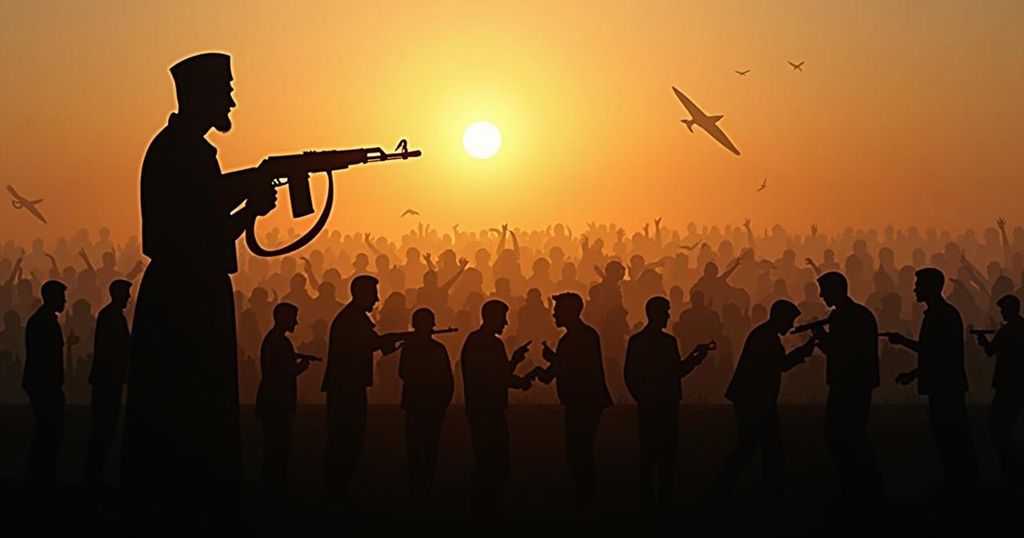The killing of Hezbollah leader Hassan Nasrallah by Israel has ignited widespread mourning and protests in Iraq, with citizens expressing solidarity and condemning the Israeli actions. Iraqi leaders, including Prime Minister Mohammed Shia al-Sudani, have condemned the act and declared mourning periods, while fears grow regarding potential conflict escalation into Iraq.
In the wake of the recent killing of Hezbollah leader Hassan Nasrallah in Beirut amid Israel’s military aggression, Iraq has experienced widespread mourning and expressions of solidarity. Imad Qusay Abbas, a 30-year-old from the Nineveh Plain, recounted his shock upon learning of Nasrallah’s death shortly after participating in a vigil supporting the victims of Israeli attacks. “We never imagined that we would return from the solidarity vigil and hear the news of the martyrdom of Nasrallah,” he stated. Following Hezbollah’s confirmation of his death, numerous Iraqis flooded the streets in cities like Basra, Karbala, Baghdad, and Mosul to honor Nasrallah and demonstrate empathy towards those affected by the Israeli operations in Lebanon and Gaza. In Baghdad, protests turned violent as demonstrators attempted to breach the heavily fortified Green Zone, resulting in arson at the U.S. embassy. These events were marked by national outrage, with Iraq’s Prime Minister Mohammed Shia al-Sudani condemning the act as a “shameful” crime that signifies a profound crisis in international relations. He honored Nasrallah as a martyr and initiated a three-day mourning period. Furthermore, Shia cleric Muqtada al-Sadr also expressed his condolences, acknowledging Nasrallah as a pivotal figure for resistance against oppression. The Secretary-General of the Iran-aligned militia, Kata’ib Sayyid al-Shuhada, emphasized Iraq’s commitment to Lebanon’s sovereignty, stating that the nation will not permit any blockade against Lebanon. Additionally, Iraq’s highest Shia authority, Sayyid Ali al-Sistani, has called upon citizens to alleviate the humanitarian plight of the Lebanese. In Khazna, mourning gatherings were held, with supporters illustrating the enduring legacy of Nasrallah through large portraits and discussions focused on his influence. Sheikh Hassan Al-Shabaki highlighted that despite Nasrallah’s physical absence, his ideology persists in inspiring his followers. A local participant remarked, “Hezbollah will not be broken and will become stronger.” Though many expressed anger towards Israel and a resolve to continue resistance efforts, there were also apprehensions regarding the potential escalation of conflict into Iraq, as fears of further violence loom in the region.
The article discusses the reaction in Iraq following the assassination of Hezbollah leader Hassan Nasrallah during Israel’s recent military actions against Lebanon. The mourning and outrage expressed by Iraqis reflect the deep connections many feel towards Hezbollah and the broader Middle Eastern conflict involving Israel. Statements from Iraqi leaders mention the perceived moral and political implications of Nasrallah’s death, positioning it as a rallying point against perceived Israeli aggression.
The widespread mourning and anger in Iraq following Hassan Nasrallah’s assassination illustrate the nation’s solidarity with the resistance against Israel. Iraqis across various political and social spectrums condemned the killing, reflecting a unified sentiment against Israeli actions in the region. The tragedy has sparked discussions around the enduring influence of Nasrallah and potential implications for broader regional stability.
Original Source: www.aljazeera.com







